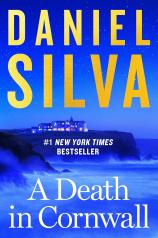Excerpt
Excerpt
A Death in Cornwall

1
The Lizard Peninsula
The first indication of trouble was the light burning in the kitchen window of Wexford Cottage. Vera Hobbs, owner of the Cornish Bakery in Gunwalloe, spotted it at 5:25 a.m. on the third Tuesday of January. The day of the week was noteworthy; the owner of the cottage, Professor Charlotte Blake, divided her time between Cornwall and Oxford. Typically, she arrived in Gunwalloe on a Thursday evening and departed the following Monday afternoon—three-day workweeks being one of the many perquisites of academic life. The absence of her dark blue Vauxhall suggested she had decamped at her usual time. The glowing light, however, was an aberration, as Professor Blake was a devout environmentalist who would sooner stand in the path of a speeding train than waste a single watt of electricity.
She had purchased Wexford Cottage with the proceeds of her bestselling exploration of Picasso’s life and work in wartime France. Her withering reappraisal of Paul Gauguin, published three years later, fared even better. Vera had attempted to organize a book party at the Lamb and Flag, but Professor Blake, after somehow getting wind of the project, had made it clear she had no wish to be fêted. “If there is indeed a hell,” she explained, “its inhabitants have been condemned to spend the rest of eternity celebrating the publication of someone else’s latest waste of paper.”
She had made the remark in her perfect BBC English, with the ironic drawl that comes naturally to those of privileged birth. She was not, however, from the upper classes herself, as Vera discovered one afternoon while stalking Professor Blake on the Internet. Her father had been a rabble-rousing trade unionist from Yorkshire and a leader of the bitter coal miners’ strike in the 1980s. A gifted student, she had won admission to Oxford, where she had studied the history of art. After a brief stint at the Tate Modern in London, and an even briefer one at Christie’s, she had returned to Oxford to teach. According to her official biography, she was considered one of the world’s foremost experts in something called APR, or artistic provenance research.
“What in heaven’s name does that mean?” asked Dottie Cox, proprietor of the Gunwalloe village store.
“Evidently, it has something to do with establishing a painting’s history of ownership and exhibition.”
“Is that important?”
“Tell me something, Dottie, dear. Why would someone be an expert in something if it wasn’t bloody important?”
Interestingly enough, Professor Blake was not the first art world figure to settle in Gunwalloe. But unlike her predecessor, the reclusive restorer who had lived for a time in the cottage down by the cove, she was unfailingly polite. Not the talkative sort, mind you, but always a pleasant greeting and an enchanting smile. The consensus among Gunwalloe’s male population was that the professor’s author photograph had not done her justice. Her hair was nearly black and shoulder length, with a single provocative streak of gray. Her eyes were an arresting shade of cobalt blue. The puffy pillows of dark flesh beneath them only added to her allure.
“Smoldering,” declared Duncan Reynolds, a retired conductor for the Great Western Railway. “Reminds me of one of those mysterious women you see in the cafés of Paris.” Though as far as anyone knew, the closest old Duncan had ever come to the French capital was Paddington Station.
There had been a Mr. Blake once, a painter of minor note, but they had divorced while she was still at the Tate. Now, at fifty-two years of age and in the prime of her professional life, Charlotte Blake remained unmarried and, by all outward appearances, romantically unattached. She never had guests and never entertained. Indeed, Dottie Cox was the only inhabitant of Gunwalloe who had ever seen her with another living soul. It was last November, down at Lizard Point. They were huddled on the windblown terrace at the Polpeor Café, the professor and her gentleman friend.
“Handsome devil, he was. A real charmer. Had trouble written all over him.”
But on that morning in January, with the rain falling in sheets and a cold wind blowing from Mount’s Bay, the state of Professor Charlotte Blake’s love life was of little concern to Vera Hobbs. Not with the Chopper still on the loose. It had been nearly a fortnight since he had struck last, a woman of twenty-seven from Holywell on the north Cornish coast. He had killed her with a hatchet, the same weapon he had used to murder three other women. Vera took a small measure of comfort in the fact that none of the murders had taken place during rainy weather. The Chopper, it seemed, was a fair-weather fiend.
Vera Hobbs nevertheless cast several anxious glances over her shoulder as she hastened along Gunwalloe’s only road—a road with neither a name nor a numeric designation. The Cornish Bakery was wedged between the Lamb and Flag and Dottie Cox’s Corner Market, which wasn’t on a corner at all. The Mullion Golf Club was about a mile down the road, next to the ancient parish church. With the exception of an incident at the restorer’s cottage a few years back, nothing much ever happened in Gunwalloe, which was just fine with the two hundred souls who lived there.
By seven o’clock Vera had finished baking the morning’s first batch of sausage rolls and traditional cottage loaf bread. She breathed a small sigh of relief when Jenny Gibbons and Molly Reece, her two employees, hurried through the door a few minutes before eight. Jenny settled in behind the counter while Molly helped Vera with the steak pasties, a staple of the Cornish diet. A Radio Cornwall newscast played quietly in the background. There had been no murders overnight—and no arrests, either. A twenty-four-year-old motorcyclist had been seriously injured in a crash near the Morrisons in Long Rock. According to the weather forecast, the wet and windy conditions would persist throughout the day, with the rain finally ending sometime in the early evening.
“Just in time for the Chopper to claim his next victim,” interjected Molly as she spooned meat-and-vegetable filling onto a circle of short-crust pastry dough. She was a dark-eyed beauty of Welsh extraction, a real handful. “He’s past due, you know. He’s never gone more than ten days without burying his hatchet into some poor girl’s skull.”
“Maybe he’s had his fill.”
“Got it out of his system? Is that your theory, Vera Hobbs?”
“And what’s yours?”
“I think he’s just getting started.”
“An expert now, are you?”
“I watch all the detective shows.” Molly folded the dough over the filling and crimped the edges. She had a lovely touch. “He might stop for a while, but eventually he’ll strike again. That’s the way these serial killers are. They can’t help themselves.”
Vera slid the first tray of pasties into the oven and rolled out the next sheet of short-crust dough and cut it into plate-size circles. The same thing every day for forty-two years, she thought. Roll, cut, fill, fold, crimp. Except Sundays, of course. On her so-called day of rest, she cooked a proper lunch while Reggie got drunk on stout and watched football on the telly.
She removed a bowl of chicken filling from the fridge. “Did you happen to notice the light burning in the window of Professor Blake’s cottage?”
“When?”
“This morning, Molly, dear.”
“Didn’t.”
“When was the last time you saw her?”
“Who?”
Vera sighed. She had a good pair of hands on her, did Molly, but she was simple. “Professor Blake, my love. When was the last time you actually laid eyes on her?”
“Can’t remember.”
“Try.”
“Maybe yesterday.”
“Afternoon, was it?”
“Could have been.”
“Where was she?”
“In her car.”
“Headed where?”
Molly inclined her head to the north. “Up-country.”
Because the Lizard Peninsula was the most southerly point in the British Isles, everywhere else in the United Kingdom was up-country. But it suggested that Professor Blake had been bound for Oxford. Even so, Vera thought there would be no harm in having a look through the window of Wexford Cottage—which she did at half past three during a break in the rain. She reported her findings to Dottie Cox an hour later at the Lamb and Flag. They were sitting in their usual snug near the window, with two glasses of New Zealand sauvignon blanc between them. The clouds had finally broken, and the sun was dropping toward the rim of Mount’s Bay. Somewhere out there beneath the black waters was a lost city called Lyonesse. At least that was the legend.
“And you’re sure there were dishes in the sink?” asked Dottie.
“And on the countertop as well.”
“Dirty?”
Vera nodded gravely.
“Rang the bell, did you?”
“Twice.”
“The latch?”
“Locked tight.”
Dottie didn’t like the sound of it. The light was one thing, the dirty dishes quite another. “I suppose we should probably ring her, just to be on the safe side.”
It took a bit of searching, but Vera eventually found the main number for the University of Oxford’s Department of the History of Art. The woman who answered the phone sounded as though she might have been a student. A lengthy silence ensued when Vera asked to be connected to Professor Charlotte Blake’s office.
“Who’s calling, please?” the young woman asked at last.
Vera gave her name.
“And how do you know Professor Blake?”
“She lives down the road from me in Gunwalloe.”
“When was the last time you saw her?”
“Is something wrong?”
“One moment, please,” said the woman, and transferred Vera to Professor Blake’s voicemail. She ignored the recorded invitation to leave a message and rang the Devon and Cornwall Police instead. Not the main number, but the special hotline. The man who answered didn’t bother to state his name or rank.
“I have a terrible feeling he’s struck again,” said Vera.
“Who?”
“The Chopper. Who else?”
“Go on.”
“Perhaps I should speak to someone a bit more senior.”
“I’m a detective sergeant.”
“Very impressive. And what’s your name, my love?”
“Peel,” he answered. “Detective Sergeant Timothy Peel.”
“Well, well,” said Vera Hobbs. “Imagine that.”



